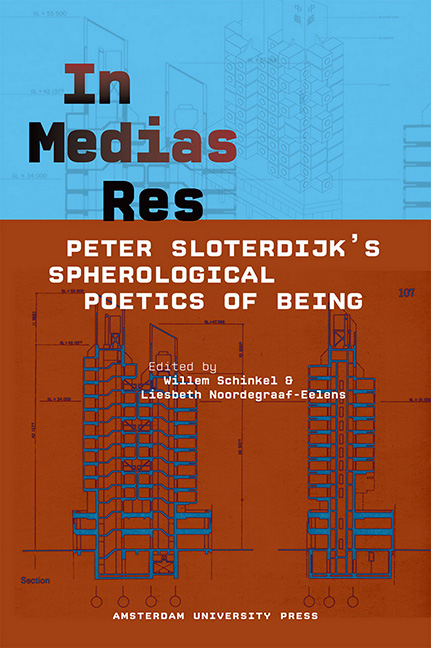Book contents
- Frontmatter
- Contents
- 1 Peter Sloterdijk’s Spherological Acrobatics: An Exercise in Introduction
- 2 Foamy Business: On the Organizational Politics of Atmospheres
- 3 “Transgenous Philosophy”: Post-humanism, Anthropotechnics and the Poetics of Natal Difference
- 4 Disinhibition, Subjectivity and Pride. Or: Guess Who Is Looking?: Peter Sloterdijk’s reconstruction of ‘thymotic’ qualities, psychoanalysis and the question of spectatorship
- 5 Sloterdijk and the Question of an Aesthetic
- 6 Uneasy Places. Monotheism, Christianity, and the Dynamic of the Unlikely in Sloterdijk’s Work – Context and Debate
- 7 The Attention Regime: On Mass Media and the Information Society
- 8 In the Beginning was the Accident: The Crystal Palace as a Cultural Catastrophe and the Emergence of the Cosmic Misfit: A critical approach to Peter Sloterdijk’s Weltinnenraum des Kapitals vs. Fyodor M. Dostoevsky’s Notes from the underground
- 9 A Cautious Prometheus? A Few Steps Toward a Philosophy of Design with Special Attention to Peter Sloterdijk
- 10 Sloterdijk and the Question of Action
- 11 The Space of Global Capitalism and its Imaginary Imperialism: An Interview with Peter Sloterdijk
- Contributors
- Index
11 - The Space of Global Capitalism and its Imaginary Imperialism: An Interview with Peter Sloterdijk
Published online by Cambridge University Press: 23 June 2021
- Frontmatter
- Contents
- 1 Peter Sloterdijk’s Spherological Acrobatics: An Exercise in Introduction
- 2 Foamy Business: On the Organizational Politics of Atmospheres
- 3 “Transgenous Philosophy”: Post-humanism, Anthropotechnics and the Poetics of Natal Difference
- 4 Disinhibition, Subjectivity and Pride. Or: Guess Who Is Looking?: Peter Sloterdijk’s reconstruction of ‘thymotic’ qualities, psychoanalysis and the question of spectatorship
- 5 Sloterdijk and the Question of an Aesthetic
- 6 Uneasy Places. Monotheism, Christianity, and the Dynamic of the Unlikely in Sloterdijk’s Work – Context and Debate
- 7 The Attention Regime: On Mass Media and the Information Society
- 8 In the Beginning was the Accident: The Crystal Palace as a Cultural Catastrophe and the Emergence of the Cosmic Misfit: A critical approach to Peter Sloterdijk’s Weltinnenraum des Kapitals vs. Fyodor M. Dostoevsky’s Notes from the underground
- 9 A Cautious Prometheus? A Few Steps Toward a Philosophy of Design with Special Attention to Peter Sloterdijk
- 10 Sloterdijk and the Question of Action
- 11 The Space of Global Capitalism and its Imaginary Imperialism: An Interview with Peter Sloterdijk
- Contributors
- Index
Summary
Q Professor Sloterdijk, you say that philosophy is its own place, raized to the level of thought. Can you tell us what you mean by spatiality in philosophy?
PS I believe that space, in a philosophical sense, is actually the great unknown of the modern world, since all speak of space but no-one was there. That has to do with the fact that we know and use at least two or three deeply differing concepts of space. One is the concept of space used by physicists, mathematicians or topologists. It is the homogeneous space, the completely neutralized space in which the equipotentiality of points is presupposed as a mathematical axiom, perhaps even as an ontological axiom. Between equipotential points one can draw an arbitrary number of lines, as many times as one would like. This concept of space is mostly used by neo-liberals and also by common commentators when they speak of globalization. They usually mistake this geometrical space of points in topology for the space of geographers. The geographer's space is a space that already comes closer to reality, to the living space of natural subjects, which understand space to be something like environment (Umwelt). For us that is usually connected to the sense of dwelling, of the space of living. So inasmuch as people are living creatures that dwell, they create a wholly different and living, vital space, a space of meaning, in which all objects around are charged with a variety of semantic values. And then there is a third concept of space, which is in a sense the most mysterious, and which my work actually deals with most – that is, the first part of my trilogy (Sphären) – and that is, how shall I put it, in a sense you put it right in your question, this ‘psychodynamic space’, which is the space in which existence takes place. Existence for me doesn't quite mean, as it does for Heidegger, that man is extended in the world. Heidegger of course translates the Latin verb existere by the Greek word extasis by association. And this ecstatis (standing-out) in Heidegger leads to the openness of the world, but also to the loneliness of the cosmic night in which man can lose him- or herself.
- Type
- Chapter
- Information
- In Medias ResPeter Sloterdijk's Spherological Poetics of Being, pp. 185 - 194Publisher: Amsterdam University PressPrint publication year: 2012

